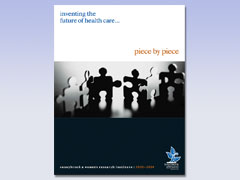Full Speed Ahead
Instant gratification? It's not exactly common in research, and most will agree instant is a relative term. When much of the most clinically critical science–such as preventing and curing disease–takes lifetimes to do, studies that can be done in a few years and affect patient care soon after are Superman fast.
Dr. Jack Tu, an internist at S&W and a senior scientist at the Institute for Clinical Evaluative Sciences, or ICES*, cross-appointed to SWRI, has done several such studies recently.
In one, he looked at heart failure. It's the most common reason why Canadians go to hospitals, but until this study in 2003, doctors couldn't tell which patients were most likely to die after heart failure. Tu and graduate student Doug Lee, the lead author, found that older age, lower blood pressure and comorbid illnesses, among other factors, were critical. Then they worked to get these findings to those best placed to use them.
What emerged was a Net-based, clinician-friendly predictive risk model and scoring system. "Doctors from all over the world can logon to our Web site and figure out immediately what their patients' risk of dying is in the next 30 days and the next year," says Tu. "They punch in their patients' characteristics, and the computer spits out what their likelihood of dying is."
Within days of the article's appearance in The Journal of the American Medical Association, they had received hits from seemingly everywhere."We're probably at over 10,000 hits now," says Tu. No wonder. It's free, takes five minutes and helps doctors to save lives.
He also gets far-flung e-mail for another study, although given the topic, not all are positive. Tu examined the practicality of getting informed consent from everyone entering a clinical – in this case stroke – registry. A registry compiles data on every occurrence, treatment and outcome of a condition. It captures no names. These data allow scientists to do observational studies that track diseases over time. To be valid, the results must be from everyone with the condition.
Tu's conclusion? "Although it's desirable to try to get consent from everybody, it's often not practical." There were too many people, and some left hospital or died before consenting. Others couldn't consent, for example, because they didn't understand the language. This left a biased sample. The New England Journal of Medicine published the results in April 2004.
Reaction was swift. Researchers were supportive. Privacy advocates, less so. The challenge now, says Tu, is to develop guidelines on consent and educate people about how registry research benefits society. "We can determine how often cancer occurs in Canada due to the cancer registry, but if (Cancer Care Ontario) had to get informed consent from everyone, the registry would probably collapse overnight. It would be a real disservice to the health of Canadians."
Although measuring the study's impact is tricky, Tu speculates it has informed the thinking of researchers, ethics boards and perhaps even Ontario's privacy commissioner, with whom he spoke. "There's been a worldwide push for researchers doing observational studies to get informed consent. I think it reversed the momentum toward that, because people are realizing it's not going to be practical," he says.
Research with the power to reverse momentum? Beat that, Superman.
*ICES is an independent, non-profit organization funded by the Ministry of Health and Long-Term Care. It uses population-based health information to produce unbiased knowledge on health care issues. It is located on the Sunnybrook campus, and many scientists in clinical epidemiology at SWRI work at ICES. Of his work at both, Tu says, "It's a synergistic and symbiotic relationship. I've benefited greatly from having both the research grants through Sunnybrook and the funding through the Ministry."
The Canada Foundation for Innovation, Canadian Institutes of Health Research, and Heart and Stroke Foundation funded these studies. Tu holds a Tier 2 Canada Research Chair in Health Services Research.
PDF / View full media release »


